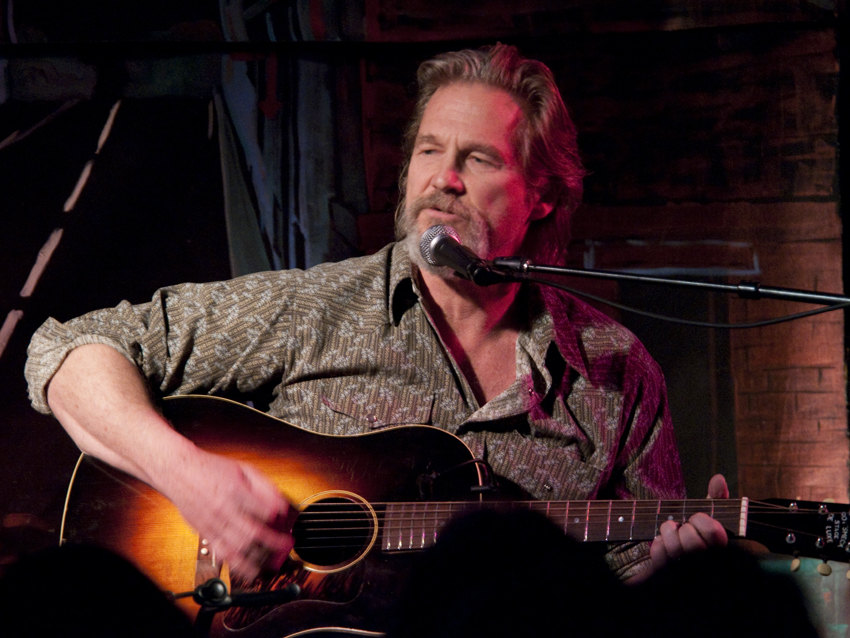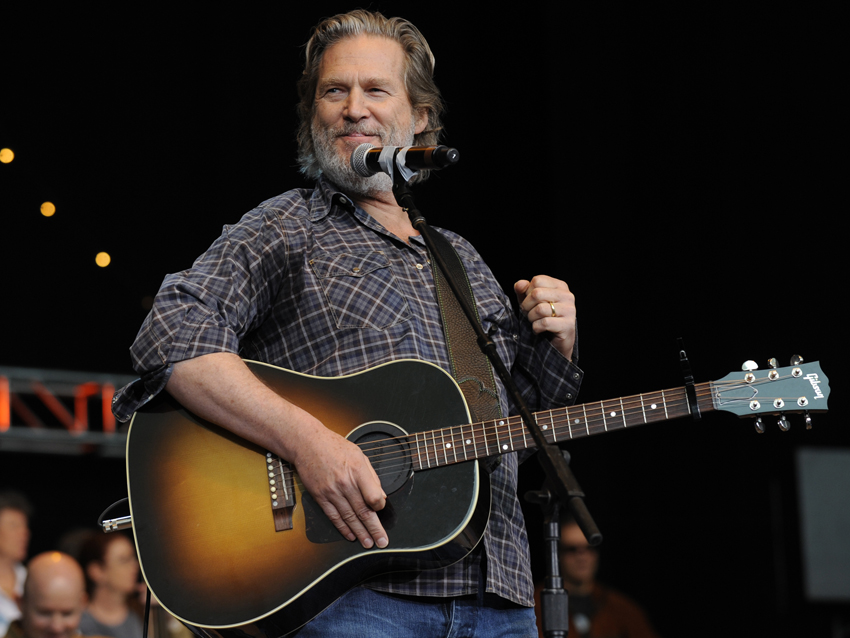Want all the hottest music and gear news, reviews, deals, features and more, direct to your inbox? Sign up here.
You are now subscribed
Your newsletter sign-up was successful

Jeff Bridges, whose self-titled album drops today, is pictured on stage in Montana in 2009. © William Campbell/Corbis
When Jeff Bridges so vividly portrayed Bad Blake, the down-and-out, alcoholic country music star in the movie Crazy Heart, a big part of him wasn't acting.
Sure, the character flaws were the stuff of fiction, but the real-life Bridges and his onscreen creation have much in common, namely a deep and abiding love of unvarnished, alt-country music, the kind of which the Oscar winner features on his self-titled album, out today (16 August) on Blue Note Records.
Produced by Bridges' longtime friend T Bone Burnett and crafted by many of the same songwriters and players who contributed to Crazy Heart (which Burnett supervised the music for), Jeff Bridges, the album, is no mere vanity project - it's the mark of a serious artist who's not trading on fame.
Even so, Bridges is aware of the pitfalls that await actors who attempt dual careers in music. "People like to put you in this slot or that slot," he tells MusicRadar. "Everybody likes to assume that you can only do one thing, that you can't possibly be good at two things. But since Crazy Heart was about a musician and I kind of pulled that off all right, I thought, Hey, maybe people will accept me now as a musician. My timing could be right."
According to Bridges, a lifelong musician who started jamming with friends while still in his teens, and who released his first album, Be Here Soon, in 2000, the need to get back in the recording studio was due, in large part, to his Academy Award triumph.
"I've been itching to make some more music for a while," Bridges says. "But doing Crazy Heart sort of primed the pump for me to record this album. It definitely made the ground fertile for me to plant those musical seeds. I kind of figured, if any time is right to do this, now's the time."
Want all the hottest music and gear news, reviews, deals, features and more, direct to your inbox? Sign up here.
MusicRadar sat down with Jeff Bridges recently to talk about his new album, what it was like to record with T Bone Burnett (or 'Bone,' as the actor fondly calls him) and how filmmaking and music aren't as dissilimar as one might think.
Even though music takes time to record, do you find the art form to be more immediate than filmmaking?
"No. They're kind of similar in that way, really. When you're doing a take in a movie, you never know what's going to happen. It can be a very spur-of-the-moment thing. The same is true for recording or performing music. To me, there's more similarities than differences."
The album sounds as though there's a bit of Bad Blake running through it. Do you hear that, as well?
"Oh yeah. I would say that's absolutely right. There's a couple of songs on there that we considered for Crazy Heart, but you only have so many slots in a movie, so not everything can get in. Some of the songs didn't fit Bad Blake's personality all the way, or at least the sides to him that we wanted to show.
"One of the things that Bone did when we were making that movie was to create a playlist for me of music Bad Blake might have listened to. It was a very eclectic mix. There was Hank Williams and Merle Haggard, Waylon Jennings and all the great country artists, but then there was The Beatles and Dylan, along with Leonard Cohen and Ornette Coleman. It expanded the scope of the music that we would use in Crazy Heart.
"The same thing held true for making the album. T Bone really wanted it to be truthful and represent the kind of music that I make, so there's songs that I wrote and songs that I love. What knits it all together is this wonderful band that he assembled."
And he surrounded you with great guitar players. Even so, your own skills on the guitar are nothing to sneeze at. Why didn't you play on the record?
[laughs] "Well, you know, when you've got Marc Ribot and Jackson Smith and T Bone, you don't really feel the need to play. I might've played some guitar on the roughs to get the guys up to speed, but it was wonderful to hear them interpret my songs and the songs that I love.
"It's fun to perform them live, of course. I put a band together to promote the album and do a little touring. It's so great, it's all of these guys that live up in Santa Barbara with me. We're calling ourselves The Abiders. [laughs] I've got Terry Rodriguez, the great fiddle player, who's singing and playing with us. And I've got my daughter, Jessie Bridges, who plays and sings with us. It's a lot of fun."
The song What A Little Bit Of Love Can Do is beautiful. Did your late friend Stephen Bruton write it for Crazy Heart?
"He didn't write it specifically for Crazy Heart, but it was one of his songs that he submitted to be considered. We thought it was great, but it didn't fit Bad Blake's style. Really good tune."
Falling Short, which you wrote, goes into some dark places.
"Huh... Yeah, you think?"
Sure. It sounds like a man who's really questioning himself.
"Well, that's a good thing! [laughs] It's good to question yourself. That's OK. Yeah, I guess it's a little dark. You ask yourself the questions, but you don't know what the answers are going to be."
Another one of your songs, Tumbling Vine, is pretty unusual. It's almost like art rock in places.
[laughs] "Yeah, that was a fun one to do. Tumbling Vine…let me think here… There's a line there that goes, 'I'm Buddhistly bent,' and I definitely consider myself to be 'Buddhistly bent.' The things that Buddha had to say certainly resonate with me."
Slow Boat is a real sonic experience. The guitars on that song are wild.
"Slow Boat...that's a real interesting song. The tune has a lot of Crazy Heart in it. In fact, in the book Crazy Heart, Thomas Cobb mentions a song of Bad Blake's called Slow Boat, but there's no lyrics or anything. So when we were looking at songs for the movie, I took a crack at writing. I played Slow Boat over the phone to Bone. He loved it, but the song never made the movie.
"Bone did write some amazing chords for it. And man, Marc Ribot just kicks it! [laughs] I was so thrilled to have him on board for this album because he's one of my favorite guitarists."

Bridges performing at Neil Young's Annual Bridge School Benefit, 2010. © Tim Mosenfelder/Corbis
The background vocals by Roseanne Cash and Sam Phillips are wonderful. Your voice really lends itself to being paired with female singers.
"Roseanne and Sam are great. Sam's an old friend - she and I go back quite a few years. Both of them are so sweet and so smart. Their tones are very distinctive and unusual. It was a great time to sing with them and hang with them."
Does music come to you as naturally as acting? When you're on the screen, one doesn't see the craft; you seem to exist in a role, effortlessly.
"Thank you, man! To me, music and acting are very similar. I approach both in kind of the same way. You know, when you're writing a song or practicing a song, there's solo aspects to it, but then you work with other artists to help come up with something that you're going to dig.
"As far as craft goes, yeah, that's what I'm shooting for, where you don't see all the wheels turning. I want things to be sort of...opaque."
Even though you and T Bone have worked together on films, this is the first time that he's produced an album of yours. What was the experience like?
"I considered Bone like a director for me. One of the things I looked to a director to help me with is to transcend myself and my good ideas when I'm playing a character. It's great to have a director who can take you past all of that and get you to the next level. And you can cash in on that.
"That's the wonderful thing about making movies and making music: they're both collaborative deals. It's almost communal. You get to take advantage of all of this energy and shake your own stuff up."
Great directors sometimes push actors into uncomfortable areas. As a producer, did T Bone do the same thing with you?
"More so when we were making Crazy Heart. There were times with that movie where I was a little panicky. I really wanted it to come out great. I love music so much that I was concerned whether or not I could catch that ball, you know? Sometimes I felt like Bone wasn't giving me enough leadership, but in the end I was very happy with the path he took, because I discovered, 'Hey, I can do this. I can do this all on my own.'
"Bone comes from the same school as a lot of great directors. You sometimes think that not a lot is going on, but what they're really doing is creating an atmosphere where people can do their best work. Usually it's a very relaxed and happy kind of situation, where everybody feels good. That's when the best work comes out."
Do you think we'll have to wait 11 years for you to do another album?
"I hope you won't. I've got a bunch of songs that are waiting to be realized, so I'm hoping another record is in the cards. Sure, I'd love to do another one. Why not?"
Joe is a freelance journalist who has, over the past few decades, interviewed hundreds of guitarists for Guitar World, Guitar Player, MusicRadar and Classic Rock. He is also a former editor of Guitar World, contributing writer for Guitar Aficionado and VP of A&R for Island Records. He’s an enthusiastic guitarist, but he’s nowhere near the likes of the people he interviews. Surprisingly, his skills are more suited to the drums. If you need a drummer for your Beatles tribute band, look him up.
